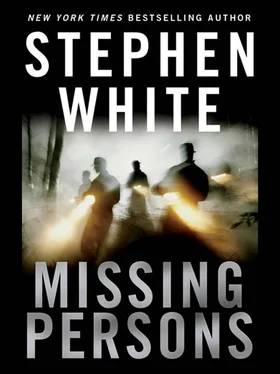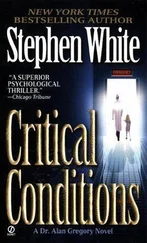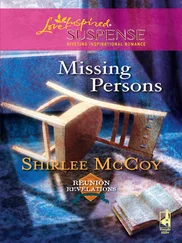All of the above? I had no idea.
“Will you miss it?” I asked. The “it” was deliberate on my part. Bob could select an object himself. Garage, job, friend. His choice.
“Miss what?” he asked, instantly abrogating the intent of my clever quiz.
Forcing myself to remain placid, I asked an obvious shrink question. I said, “I don’t know. What do you think you will miss?”
Bob sometimes did this thing with his head that was exactly half of a shake. He’d turn his head to one side-I thought exclusively toward the right, but I wasn’t done testing that hypothesis-and begin a head-shaking motion, but he would interrupt the arc of the shake precisely at the moment his nose was back at the neutral position. The movement wasn’t graceful; it was abrupt. His face would jerk to a stop as though it had smacked into an invisible obstacle. Typically he accompanied the motion with a verbalized, “Sheeesh.”
Years before, I’d had another patient who possessed the same bizarre affectation. I found that curious; it was like knowing two people who each had a sixth finger growing out of his elbow.
Bob chose that moment-after I pressed him a second time on what he would miss were Doyle to sell the house-to do the half head-shake thing, and he included the exasperated “sheeesh” for emphasis.
As I always did, I interpreted the little choreography as a sign of his impatience. With many patients I would probably have kept my interpretation to myself, but with Bob I tried to do as much as possible out in front of the curtain. Human behavior was already enough of a mystery to him.
“You didn’t like my question?” I said to reveal the progression of my thoughts.
“I don’t like anybody’s inane questions.”
The “anybody’s” was Bob’s way of cushioning the blow, of telling me not to take his “inane” rebuke personally. I considered the fact that he was depersonalizing the insult as another sign of clinical progress. On another day I would have been patting myself on the back at the emergence of even that paltry evidence of Bob’s growth in compassion.
Not that day, though. I knew it was my turn to speak, but I decided to pass. Where Bob chose to go next would tell me something.
I figured that Bob was waiting for me to take my turn in this real-life board game of ours. After a long pause, he shifted his gaze from the fascinating blankness on the wall behind me, chanced the briefest of glances at me, and then began looking at his hands. His eyeballs began to shimmy.
As always, it gave me the creeps.
Finally, resigned that I was upsetting the world order by skipping my turn, he said, “It’s not safe yet. I’m not sure what I’ve gotten into. It’s just too soon.”
Huh? “What’s too soon? I don’t think I understand.”
“There’s a lot I don’t get,” Bob said.
What the hell are we talking about? “For Doyle to sell his house?”
“I’m not sure everything is turning out, you know, the way… It might have been a mistake. I stumble into stuff, I do. Not very often, but, boy, when I do…”
“Are you talking about Mallory again, Bob?”
He did the half head-shake thing one more time and exclaimed, “Sheeesh.”
I am-almost without fail-thoughtful during psychotherapy sessions. My words are measured. My mannerisms are controlled. It is unusual that I say or do anything while in a treatment session that is not considered and deliberate. That is not to say that I don’t often say things that are, in retrospect, ill advised or outright stupid. Rather it is an acknowledgment that when I do, it turns out that I have made the ultimately questionable move with conscious intent.
But the next question that I asked was actually no more deliberate than had been my decision to reach across the hall and try the knob on Mary Black’s office door on the day that Hannah Grant died. What I said was, “Why don’t you tell me about Doyle?”
Doyle had to be important. Bob, who lived his life devoid of relationships, apparently had one-however loosely defined-with this guy Doyle. In this psychotherapy, with this patient, with his problems, that was monumental news.
Was the presence of Doyle in Bob’s life a sign of some drift in the continental plates of Bob’s pathology? I had to suppose that it was. Could Bob really have a friend? But if Doyle was important, why hadn’t Bob mentioned him to me before that day?
Did Doyle’s sudden appearance say something I couldn’t afford to miss about my relationship with Bob? Or perhaps, more importantly, about Bob’s perception of his relationship with me?
The context of Doyle’s emergence in Bob’s psychotherapy was significant, too. Bob had decided to talk about Doyle while he was discussing loss. The “loss” in question was, at the surface, the loss of a garage for his cherished Camaro, but the fact that he raised the issue of Doyle in the context of any attachment had to be significant. Right?
Maybe. I admit that I wasn’t totally certain. Part of me thought I might be making a classic psychotherapy reach.
This work I did was much more art than science.
“Doyle’s just a guy,” Bob said in reply to my question.
With as much nonchalance as I could muster I said, “But you’ve known him a while? I don’t think you’ve mentioned him before.”
“I don’t know him. I park my car at his house. And I’m sure I mentioned him.”
“And you work for him sometimes.”
He pondered my words for five seconds before he said, “I work for the state of Colorado, too, but I don’t know the governor.”
It was a good retort; I reminded myself that Bob was a smart guy. As an employee of a university that was suffering through an era of eroding state support, Bob wasn’t terribly fond of Colorado governor Bill Owens’s style of leadership. When Bob mentioned the gov during one of his not-infrequent political rants, he typically called him “Invisi-Bill,” not “Governor Owens.”
I chose to avoid the partisan detour. “Before last week you hadn’t mentioned Doyle.”
He backed off his earlier position. “So you say. Unless I’ve been misunderstanding something, I’m here to talk about problems. Doyle hasn’t been a problem. He’s a guy. I do some work for him; he lets me use his garage. That’s all, folks.”
The Looney Tunes allusion was an interesting addition to Bob’s repertoire. I hadn’t heard it before; with him, comical touches were as rare as zits on starlets. But I convinced myself to ignore it, confident it would come back around if it was important. I could’ve let the Doyle thing drop, too, maybe should have. But instead I chose to push a little harder. “I find it interesting that you’ve never mentioned him before.”
His frustration blossomed. “Really? You find that interesting? I haven’t talked about the teller I use at the bank either. But I see her every week, too.”
Did he say “use”? He “uses” a teller? And who, in the age of ATMs, lays eyes on a bank teller every week? Wouldn’t a schizoid guy love the age of ATMs?
I had a few choices as to where to go next, one of which was the tempting bank teller/ATM question, but I suspected that it-like Invisi-Bill and Looney Tunes-was a blind alley. I went with what looked like the no-brainer: “By talking about him now are you suggesting that Doyle has become a problem?”
“Only if I need to find a new place to park the Camaro. When that happens, then, well… then I have a problem, don’t I?”
“If Doyle sells the house?”
“When. Yes.”
“And your current landlord doesn’t have any garage space you can rent?” I wouldn’t have asked most patients that question. But Bob often missed the forest for the trees, or vice versa, and part of my job was to help him understand how the world works, especially those parts of the world that are inhabited by other people.
Читать дальше












